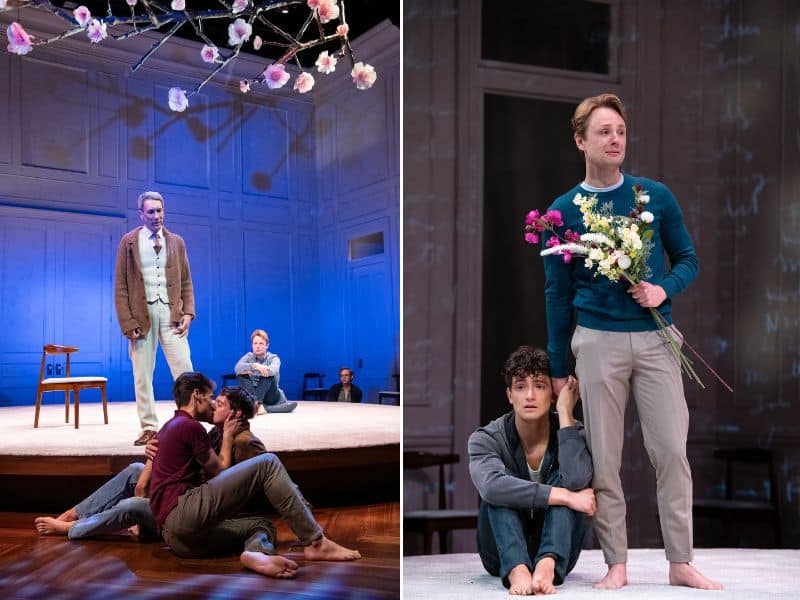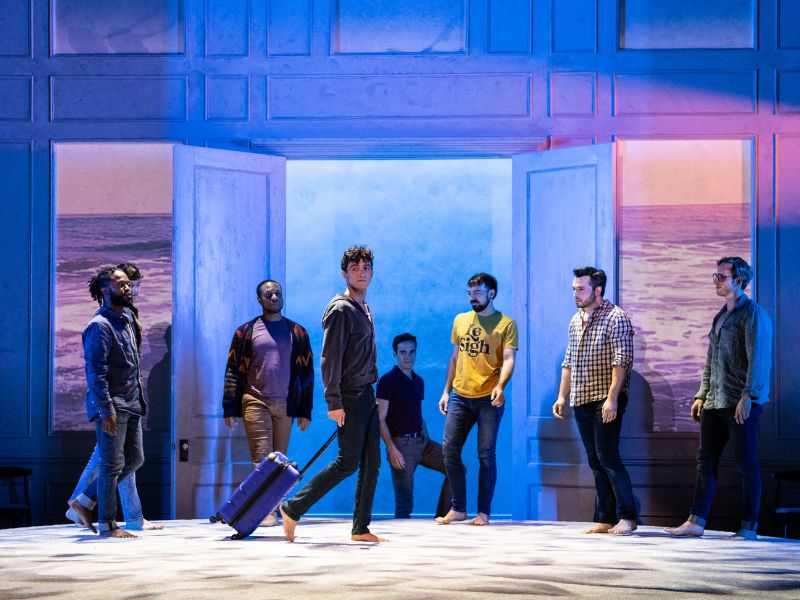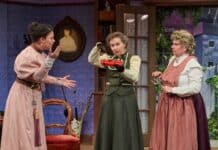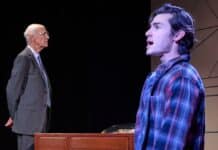Three hours outside of Manhattan, there is a house that Henry Wilcox and Walter Poole (two characters in The Inheritance) moved into during the 1980s when the relentless reality of AIDS in the city became more than either of them could bear. While Henry is away on business, Walter takes a friendless man living with AIDS into their home and cares for this man until the man dies. Angered by Walter’s actions, Henry moves out but leaves the house to Walter. Decades later, having survived the AIDS epidemic, and his age having forced him to move back into the city, Walter meets Eric, a young gay man of a generation who did not experience the epidemic firsthand. On his deathbed, Walter scribbles a note to Henry urging him to give the house to Eric. Thus begins a spiral of therapeutic care that continues to the present with the potential to continue into the future. The house is the first and most overt metaphor of inheritance in this piece.
The other inheritances are less concrete, but they emanate from this one: the inheritances of connection and community. The attempt to balance all three inheritances — connection, community, and property — is a major source of heartbreak and resolve in the play.
Round House Theatre’s production of The Inheritance is a thrilling and awe-inspiring combination of poetic, evocative writing and daring performances by a cast whose honed voices and bodies engage rigorously with the important temporal and spiritual issues raised in the play.

Before the play even begins, the set vibrates with readiness. The stage design by Lee Savage is stark and symbolic, like the theater architecture of ancient Greece. A large, neutral-colored, round platform occupies most of the stage floor. The upstage back wall is featureless in its whiteness. Colors projected on it (lighting design by Colin K. Bills) shift its contours. It is like a wall surrounding a castle/fortress. Its central doors open with portentous ceremony.
This wall is punctuated with numerous windows, the shades of which are, noisily and vigorously, shaded or unshaded, emphasizing moments when important crossroads in the characters’ lives are reached and acknowledged. Suspended above this central arena are the branches of a massive cherry tree in bloom, gorgeously impossible and impossible to ignore.
As directed by Tom Story, The Inheritance is both a ritual of celebration and an act of remembrance, reminiscent at times of Ntozake Shange’s For Colored Girls... Britta Joy Peterson’s choreography makes the language itself feel like dancing, rhythm pulsing through the words. It is also a prayer — or, at least, a kind of séance — asking not only for help with the creation of the very story we are witnessing, but more deeply for the healing of the gay community and the wider world it inhabits. There is a lot of grief in the process; a lot of uncertainty and a lot of hope.
The Inheritance, comprising two parts (each over three hours long, including intermissions), is a broad and comprehensive exploration of the legacies that an older generation of targeted individuals leaves to the next generation. It also explores the debt that the succeeding generation owes to their elders and ancestors. The targeted folks in this case are gay men, especially white gay men. The progress of “gay liberation,” AIDS, and the evanescent forging and maintaining of community and connection across class lines are the foci around which the play functions. Playwright Matthew López cites E.M. Forster’s Howard’s End as the inspiration for The Inheritance, drawing our attention to one pointed statement from the novel: “Only connect.” James Baldwin (whom López identifies as another important influence on his work) noted: “What connects us, speaking about the private life, mainly remains unspoken.” In a way, it is the tension between Forster’s direction and Baldwin’s observation that powers the play through its moments of weeping, delight, exhilaration, and awe.

Part One introduces us to a large group of modern gay men who have formed a family among themselves. Every actor in this production could have their own one-person show, holding our attention and conveying emotions. It’s an abundance of riches. Most of our attention is focused on traumatized and ambitious Toby (the spectacular Adam Poss), a playwright; Eric (a highly focused and empathic David Gow), who is the person holding this group together; Adam (the mercurial Jordi Bertrán Ramírez, who also plays Leo, Adam’s doppelgänger), a young, aspiring, gay actor who Eric and Toby take under their wing; and the tasteful, effete Morgan (the masterful Robert Sella).
Part Two brings us Nancy Robinette as Margaret. If you have been a theatergoer in Washington, DC, it is more than likely that you have seen Nancy Robinette give a master class on acting in any production that she is a part of. It is no different here. The character of Margaret is the only woman in the cast. Robinette traces Margaret’s story, from her son’s birth, through their estrangement, to his death from AIDS in the very house that Eric now owns. Her performance is uncluttered, with no self-pity and no request for sympathy. Robinette allows Margaret’s humanity and acceptance of her life’s lessons to fully inhabit the stage. It’s a devastating performance.
While this production usually soars, two moments fall flat. At one point, there is a recitation of gay icons and their accomplishments. At another, there is a debate between a gay “conservative” and a gay “leftie.” Despite the performers’ skill in attempting to make these moments seem conversational or heartfelt, I did not buy either of these moments.
The play ends with the possibility of hope, but questions, challenges, and longing hang in the air:
What do gay men owe to each other from one generation to another?

Throughout the play, characters return again and again to a longing for others to truly recognize their worth — to be seen as beautiful, human, and valuable. The house that becomes a place of healing embodies this desire, giving it concrete form. Yet, with the tragic end of one of the central characters, the play also poses a harder question: if we cannot hold that space of recognition for one another, or allow others to hold it for us, can our liberation and pride ever be fully realized — or will they remain, at least for now, incomplete?
Running Times:
The Inheritance, Part One: Approximately three hours and 25 minutes, including two 15-minute intermissions.
The Inheritance, Part Two: Approximately three hours and 15 minutes, including one 15-minute intermission and one 5-minute pause.
The Inheritance plays through November 2, 2025, at Round House Theatre, 4545 East-West Highway, Bethesda, MD (one block from Bethesda Metro station). Tickets ($50–$108) can be purchased by calling 240-644-1100, visiting the box office, or online (Learn more about special discounts here, accessibility here, and the Free Play program for students here.) Tickets are also available on TodayTix (Part One) and (Part Two).
The digital program for The Inheritance is here
Advisory: Photography and video are strictly prohibited. Upon arrival, patrons will be asked to place a sticker over the camera on their phones, and it must remain in place for the duration of the performance. (Stickers are residue-free and are easily removed at the conclusion of the performance.)
COVID Safety: Round House Theatre no longer requires that audience members wear masks for most performances. However, masks are required for the performances October 14 (Part One) and October 21 (Part Two). Round House’s complete Health and Safety policy is here.
The Inheritance
By Matthew López
Inspired by the novel Howards End by E.M. Forster
Directed by Tom Story
CAST
Adam Poss (Young Man 10/Toby Darling), David Gow (Eric Glass), Jordi Bertrán Ramírez (Young Man 1/Adam McDowell/Leo), Robert Sella (Morgan/Walter Poole), Robert Gant (Henry Wilcox), Jamar Jones (Young Man 6/Tristan), Hunter Ringsmith (Young Man 7/Jasper/Paul Wilcox), Nancy Robinette (Margaret), Cole Sitilides), Dylan Toms (Young Man 4/ Young Walter), Jonathan Atkinson (Young Man 8/ Jason #2), Ben Bowen (Young Man 5/Toby’s Agent/Charles Wilcox), John Floyd (Young Man 2/ Jason #1). Understudies: Anthony de Souza, Eric Hissom, Elizabeth Pierotti, Drew Sharpe, Theodore Sherron III, James Whalen
SEE ALSO:
Round House to present award-winning ‘The Inheritance (news story, July 5, 2025)



